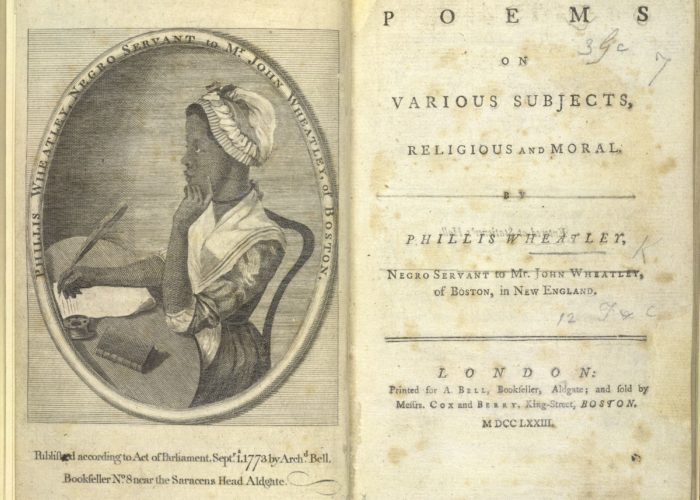Phillis Wheatley, Poems on various subjects, religious and moral
Theme: The arts in the Age of Revolution, American revolution, Social and cultural revolution
Phillis Wheatley was a talented poet who acquired international renown and became the first black woman in both Britain and the USA to have a book published. Her Poems on Various Subjects, Religious and Moral was published in 1773, the year in which she was manumitted from slavery and became free. Her personal circumstances did not improve with the change in status, and she died in poverty aged 31, but her revolutionary writing has endured.
Phillis Wheatley (c.1753-1784), was born in West Africa (most likely in present day Gambia or Senegal). At the age of about seven years old, she was captured, transported to the Americas away from her family and sold to the Wheatley family to work as a slave. The family changed her name to ‘Phillis’, after the ship that had transported her across the Atlantic.
Phillis became a household servant for the Wheatleys, in Boston, who taught her to read and write. She studied widely, including British literature, Greek and Latin, learning to translate both languages, and write poetry. Some of her early poems were published in local newspapers and pamphlets and, by the age of 18 she had written enough for a book. At the age of 20, Phillis was tasked with accompanying the family’s eldest son, Nathaniel to England. There she succeeded in publishing her volume of poetry, in 1773, making her the first African-American and first African-American Woman to be published.
Her book was a success and received critical acclaim on both sides of the Atlantic, although others claimed that her work was too sophisticated to have been written by an African. Her poetry was based on classical themes, Christianity, the ‘new world’ of America and her African heritage. She also wrote about her experiences of slavery and spoke out against it at public meetings.
In 1778, John Wheatley, Phillis’ master, legally freed Phillis, allowing her to marry John Peters, a freed African-American. But the deeply engrained racist attitudes of the time meant life was hard for freed slaves, especially during the American War of Independence. The couple struggled with ill-health, a low income and the death of two of their children in infancy. Phillis died in 1784, aged just 31.
Did you know..?
In 1776, George Washington, later the USA’s first president invited Phillis to visit after a copy of her poem To His Excellency, George Washington was sent to him. He is said to have told her: “The style and manner [of your poetry] exhibit a striking proof of your great poetical Talents”.
Sources & acknowledgements
This object description and its related educational resources were researched and written by our team of historians and education specialists. For further information see the item’s home museum, gallery or archive, listed above.
-
Education overview
You can access a range of teachers resources related to this object and more on our education page.
Please also see our glossary of terms for more detailed explanations of the terms used.
-
Curatorial info
- Originating Museum: British Library
- Accession Number: 992.a.34.
- Production Date: 1773
- Creator: Phillis Wheatley
- Creation Place: London
- Original record
-
Use this image
You can download this image for personal and educational use but please take note of the license type and rights holder information.
- Rights Holder: British Library
- License Type:



